In recent weeks, we have seen again and again how the acid of hyperskepticism has reduced our civilisation’s confidence in self-awareness much less understanding of the world and its roots. Even as Evolutionary Materialistic Scientism, Officialdom and their media promoters (and censors) seek to create a dominant narrative. So, how do we attack this issue?
First, let’s reduce it to a graphic:
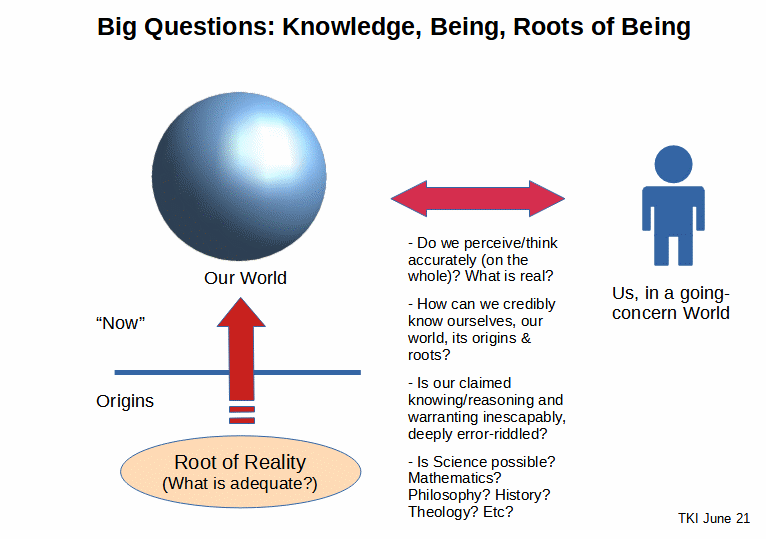
Once that is on the table, it is clear that our diverse worldviews and the extent to which any such can claim to be well warranted knowledge are at the crux of the matter. As a key aspect, as we are ourselves embedded (“apparently,” embodied with brains, senses tied to brains and self-awareness) in the going concern world, self-referentiality is inescapably entangled in the matter. So are questions of origins and the root of reality. The hyperskepticism-induced loss of confidence is manifest in our tendency to radical relativism, subjectivism and emotivism, all of which suffer serious self-referentiality challenges and undermine claimed knowledge.
Such surfaces the grand delusion challenge long ago exemplified by Plato in his parable of the cave:
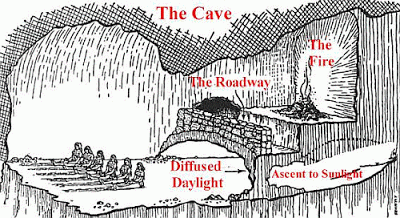
Of course, we should not neglect the cynical, power-manipulation Overton Window dimension of this parable:

Yes, in a hyperskeptical-cynical world, somebody is looking to gain power and likely wealth from our loss of confidence. We must bear that in mind. Similarly, the now commonly used parable of blind men and an elephant is instructive:

Here, we can focus Jesus of Nazareth’s remark on good/bad eyes, from his Sermon on the Mount, using words that tellingly echo Plato’s parable:
Matt 6:22 “The eye is the lamp of the body; so if your eye is clear [spiritually perceptive], your whole body will be full of light [benefiting from God’s precepts]. 23 But if your eye is bad [spiritually blind], your whole body will be full of darkness [devoid of God’s precepts]. So if the [very] light inside you [your inner self, your heart, your conscience] is darkness, how great and terrible is that darkness! [AMP]
That’s the elephant we face!
The question is, are we willing to acknowledge that someone has a better, more valid overall picture than we do? (Our tendency to cynical hyperskepticism tends to lock us into, “no.” It also tends to make us miss that relativism or the like equally claims to be the better big-picture. Incoherent self-referentiality, again.)
So, we come to a Reidian, common sense driven conclusion in two principles:
REID+, 1 — Rejection of Grand Delusion: Any world-scheme or alleged first principle of thought that leads to or invites a grand delusion inference is self-referentially absurd, and
REID+, 2 — Principle of Common Sense Credulity: While our common sense reliance on our senses and perceptions may be mistaken in detail, the inference that our common sense view of the going-concern world we share is delusional on the whole is thus . . . saw- off– the- branch- on- which- we- all- sit . . . absurd.
In that light, we can address the chain of concerns in the first graphic above:
- We have reason to believe our common sense experience of the going-concern, everyday world, though limited and subject to correction in detail (and obviously a macroscopic, slow-speed, localised view), is on the whole reliable and reasonably accurate; thus, Plantinga-sense fit for purpose relative to knowledge acquisition.
- Knowledge in the going-concern world thus becomes possible on three levels: first, our personal world experience as self-aware creatures is just that, undeniably our experience. If one is appeared to redly and roundly, that is a datum of experience.
- Secondly, as we can see from 2 + 3 = 5 — i.e. || + ||| –> ||||| — or error exists or inescapable first principles [including first principles . . . and, yes, associated Ciceronian first duties . . . of right reason], there are certain truths that are self-evident, certain, plumb line that — while never nearly enough to frame and furnish a worldview — serve as key tests for soundness.
- Third, for practical thought, work, education, media, science, governance, community and life, a weaker, corrigible sense of knowledge is also reasonable: warranted, credibly true (so, tested and reliable) belief.
- This weak sense may indeed have in it various errors, but is corrigible in light of first self evident principles informed by our experiences. However, such cannot amount to a Plato’s cave grand delusion, on pain of collapsing credibility of rationality thus our own selves as rational creatures.
- In this light, we can dismiss general hyperskepticism as a grand delusion fallacy; and if it is selectively applied to what one is inclined to dismiss (oh, YOU have to prove beyond all arbitrary doubt that . . .) , it is little more than an excuse for question-begging hostile closed mindedness.
- Further to these, disciplines of thought are feasible and can build up valid bodies of credible but corrigible knowledge claims: philosophy, ethics, physics, mathematics, sciences and arts generally, including history, theology etc.
We can directly apply the above to an analysis of ourselves, i.e. we can partially and yet credibly form a self-understanding. A useful framework for this is the Smith model:

Simplifying for our purposes:

Here, we see that a two-tier cybernetic loop controller view allows us to raise the issue that the supervisory controller may embed an oracle expressing volition and intuition (including moral intuition) etc, allowing transcending of undecidability and halting problems etc that plague Turing-based computational substrates.
Where, obviously, such an oracle is not simplified to being a higher level Turing machine; that would only export the Turing problem up one level.
When queried or informed implying a query, the oracle issues a single stage answer and is a black box relative to the Turing paradigm. Thus to some degree it embeds a knowledge and intuitions base. In addition, in supervisory state, it frames the context in which action is taken, being further informed by rational, responsible (so, moral sense, conscience-guided) freedom.
From that going concern self-model, we may proceed to address the basis for, dynamics of and origins of a world that includes such creatures. Notice, this is an onward question, for without a frame for rational, responsible, knowing, free but guided thought, decision and action, there is no basis for addressing how can we know a now passed past of origins and linked substructure on roots of reality. (The attempt to hopelessly entangle ontology with epistemology, fails.)
In that context, we can immediately see that causes create effects, which may come in degrees. How much sugar is in a glass of water affects how sweet it will taste. This has immediate applications, e.g. here is a video screenshot I recently shared with policy influencers, i/l/o issues on Ivermectin — and note, this is not to excite a side-debate. (Yes, I am aware of the report of a study on Ivermectin, but frankly fear it can be twisted into a kill-shot attempt given the toxic, ideological and interests distorted state of such research.) Note, Peru is a state with about 33 million people in 25 states, comparable to Canada at 36 millions:
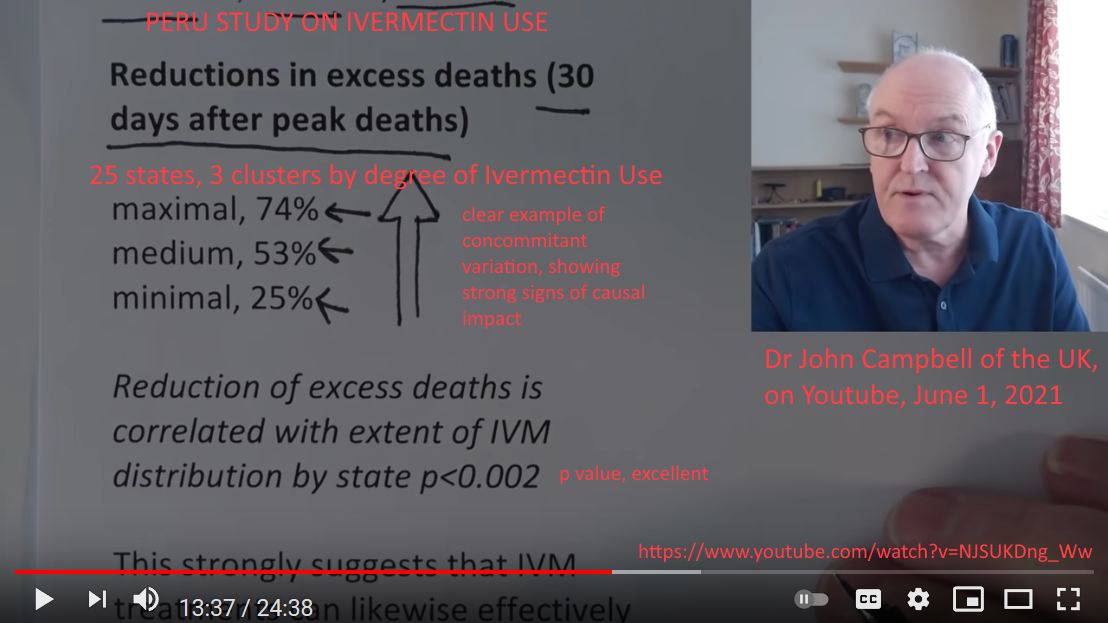
It is in that context (with other similar real-world, observational study/experience driven results/evidence) that the Frontline Doctors have just challenged Officialdom on Ivermectin:
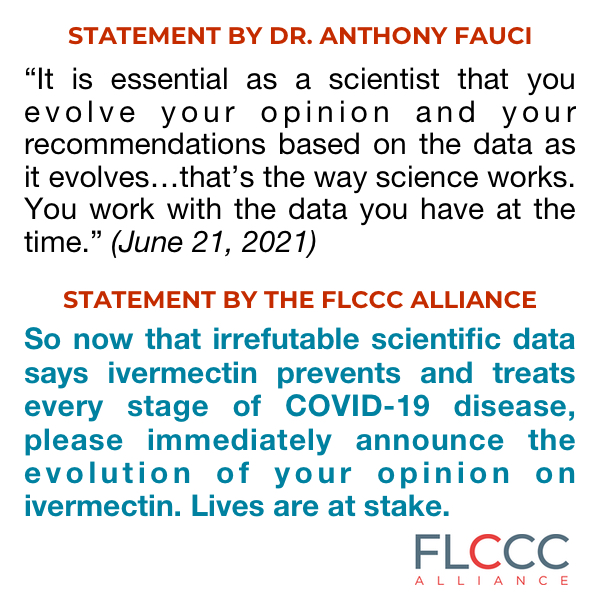
Underlying, given intent to address roots of reality, is the logic of being . . . which we can know based on analysis:
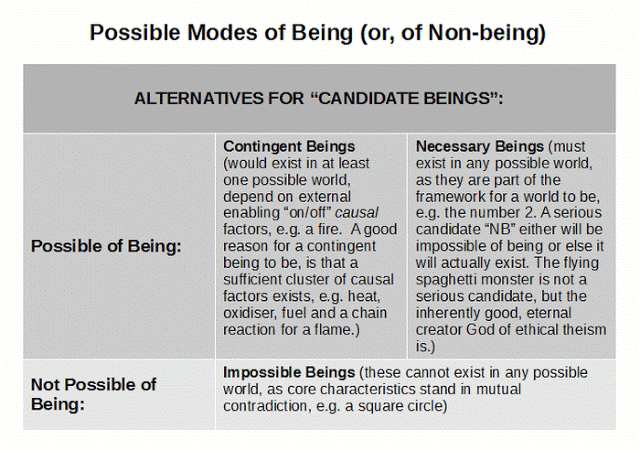
Compare, a flame:

. . . with the fire tetrahedron, which gives causal conditionality:
 Public domain
Public domainFires are contingent, possible beings, even as square circles are impossible of being:

So, now, we can contemplate another order of possible being. To see it, try to imagine a distinct world in which two-ness, distinct identity etc do not exist. Or where it begins or may cease. Immediately, such fails as a distinct world W must differ from its neighbour W’ by having some A not in W’, in effect W = {A|~A} where ~A = W’. We see that two-ness is part of the framework for any world, so once there undeniably is a world [ours] it is a necessary being, part of the fabric of any world. That applies to mathematics and its universal power, but it shows that necessary, world framework entities are real.
The root of reality, world zero, W0, in effect, embeds such beings with the additional point that through origins processes such must account causally for this world, We.
This brings to bear issues on fine tuning evidence, the complex, functionally specific, algorithm, code and language using framework of cell based life, body plan biodiversity requiring 10 – 100+ million bits of incremental information per plan, and our own morally governed, minded life.
Those questions and many more are not going to go away quietly simply because they are inconvenient to today’s establishment. END
